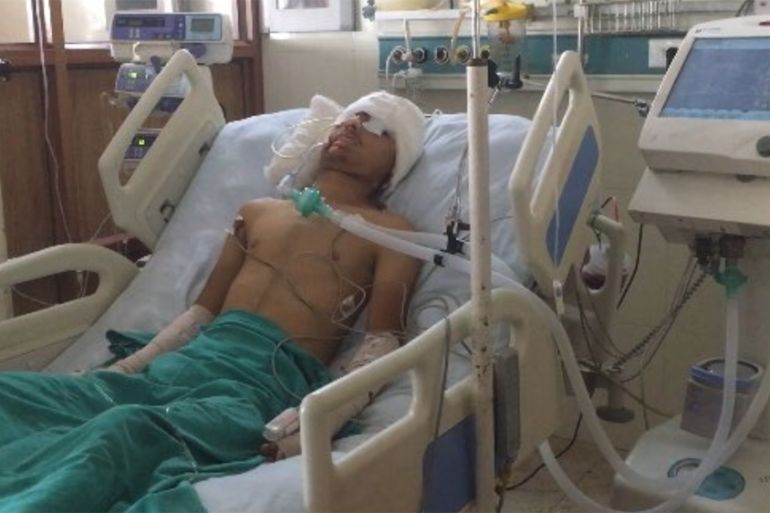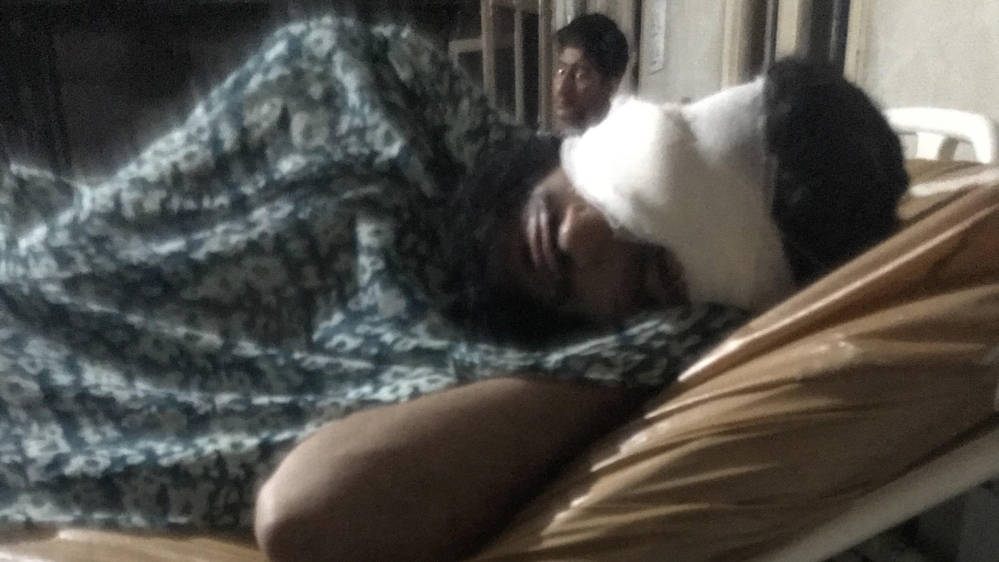Kashmir: Civilians severely wounded in pellet gun attacks
Srinagar residents share details of how some locals are fighting for their lives amid lockdown.

Srinagar, Indian-administered Kashmir – On Tuesday evening, 16-year-old Asrar Khan was on his way to a playing field just outside his house in Ellahi Bagh area of Srinagar, Indian-administred Kashmir.
Moments later, the teenager was being rushed to hospital on a motorcycle, bleeding profusely from his head.
Keep reading
list of 4 itemsGeorgia’s president vetoes controversial ‘foreign agents’ bill
‘Regime machinery operating efficiently’ as Tunisia cracks down on dissent
Why Egypt backed South Africa’s genocide case against Israel in the ICJ
According to witnesses, a returning group of Indian paramilitary troops fired a tear gas shell at Khan. He was also hit by pellet gun shrapnel in the face. Doctors at the Shere Kashmir Institute of Medical Science (SKIMS) operated on him during the night after CT scans revealed severe internal bleeding in the head.
Another witness said there was no protest in the area prior to the incident.
The grade-11 student remains in critical care and doctors are closely monitoring his condition.
A medical official at the hospital told Al Jazeera that the young boy is likely to lose vision in both his eyes if he survives.
“He has suffered serious head injuries and our priority right now is to save his life,” said the official who wished to remain anonymous.
At SKIMS, one of the largest government-run hospitals in Srinagar, there are five to six young boys who have been wounded by Indian paramilitary troops since the military crackdown began in the disputed region on Monday, according to the official.
Another boy, from the Bemina area of Srinagar, was hit by a pellet gun shell at close range. He has suffered severe lacerations to his chest but his condition is said to be stable.
Khan’s cousin, Adil, said the family no idea the 16-year-old had been wounded until a neighbour informed them.
He added that local police officials visited them during the night and asked them to remain calm.
“He is so young, he doesn’t deserve to be like this. Just yesterday, he was playing with the sheep we had brought for Eid [Muslim religious festival],” Adil said, adding that Khan’s father was allegedly wounded when he was turned away by paramilitary troops on his way to the hospital.
— Adnan Bhat (@Adnanmbhat) August 8, 2019
A presidential decree issued on Monday revoked Article 370 of India’s constitution, which guaranteed special rights to the Muslim-majority state, including the right to its own constitution and autonomy to make laws on all matters, except defence, communications and foreign affairs.
Before the announcement, the Indian government had launched a strict military clampdown on the seven million residents of the Kashmir valley.

In an unprecedented move, the Indian government closed schools, banned public meetings and cut off all modes of communication, including internet access and landlines.
Indian paramilitary forces have erected barricades every few hundred metres across the main city of Srinagar to halt civilian movement.
At Lal Chowk, in the centre of Srinagar, speakers mounted on paramilitary vehicles blared warnings that anyone seen violating the curfew would be detained.
‘He said he will shoot me’
On Tuesday, a day after Interior Minister Amid Shah announced New Delhi’s controversial move, Nazima Bano was sitting in her house in Srinagar when she heard the sound of bullets and tear canisters.
“I locked the main door of my house and asked my husband and brother-in-law to stay indoors,” the 35-year-old recalled. “I heard people chanting slogans against Amit Shah.”
Bano knew clashes were taking place between protesters and Indian forces very close to her house. To seek refuge, demonstrators began entering houses in the area, including Bano’s. “I was in the kitchen when I heard loud bangs at the door. I was scared. But before I could see or say anything, the Indian forces entered the courtyard and started beating everyone up,” Bano said.
A few of the family members jumped from the first floor to escape while the others were severely beaten, Bano said.
“Almost 16 armed forces officials started beating him [one protester in her house], some with sticks, some with guns. I jumped out and tried to save him even though I didn’t know him.
“He was so young and it pained me. One official held the gun to my chest said he will shoot me if I stopped them. They kicked me in my stomach and as I fell to the ground, they dragged him out and took him away in their armed vehicle.”
Protests have been ongoing in the Indian-administered Kashmir since India’s decision on Monday. However, with a communications blackout and ban on journalists’ movements, news of the protests has not been shared globally.
Al Jazeera has been getting information from the ground via local journalists using satellite phones, or wi-fi available in certain parts of the region. Information has also been shared via USB drives that are delivered to the airport and taken to cities in India by passengers.

A few kilometres away from Bano’s house, troops used tear gas canisters, pellets and bullets to disperse protesters.
Saleem (name changed) was watching from his window when he saw a man falling to the ground.
“He was my neighbour. But before we could lift him, another person fell. Both of them were hit by pellets in their eyes,” Saleem said.
Due to lack of transport, Saleem sat one of the wounded on his motorcycle and reached Shri Maharaja Hari Singh Hospital, crossing more than 20 barricades and checkpoints on his way.
At the hospital, Saleem realised there were many others suffering from with bullet and pellet wounds.

“There were a lot of people from mostly south and central Kashmir. My neighbours are 16 and 19. But I was shocked to see a few pellet victims who were younger, one was a four-year-old.
“The government will deny these injuries as there is no proper reporting or documentation of these incidents. We won’t be able to know about most of the casualties.”
In Nawab Bazar, Srinagar, Haleema sent her son to check on her relatives who lived a few metres away.
“After half an hour, a neighbour came to me and said my son received pellet wound in his left eye. I asked one of my neighbours to drive me to the hospital. I found my son lying on the bed. There were others as well.
“Right now, Kashmir is on fire. My family members don’t know where we are.”
|
|